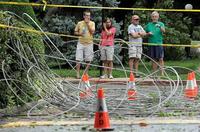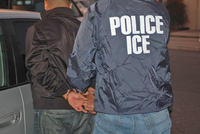-
Virginia receives $40 million in federal disaster aid following quake
Following the rare east coast earthquake last year, Virginia has received nearly $40 million in federal disaster aid
-
-
New York overhauls emergency response capabilities post-Irene

Last week New York Governor Andrew Cuomo proposed a series of major initiatives to bolster the state’s emergency response capabilities; the proposals specifically incorporate lessons learned from the state’s response to Hurricane Irene and Tropical Storm Lee
-
-
The challenge of fighting Lashkar-e-Toiba
In her debut guest column, Bidisha Biswas, an associate professor of political science at Western Washington University, explores the threat that Lashkar-e-Toiba poses to the United States as well as India and Pakistan and what can be done to stop the extremist group
-
-
SOUTHCOM deploys radar that sees through foliage, rain, darkness, and dust storms
Lockheed Martin’s TRACER is a light weight, low-frequency synthetic-aperture radar that can peer through foliage, rain, darkness, dust storms, or atmospheric haze to provide real-time, high-quality tactical ground imagery; U.S. Southern Command has just deployed the penetrating radar to support the Command’s counter-terrorism and humanitarian assistance missions, and disaster relief operations
-
-
Police wary of suicide attempts at 9/11 memorial

Aside from the threat of terrorism, the New York City Police Department worries about the risks of suicide at the national 9/11 memorial; The memorial is focused around two sunken granite pools where the World Trade Center towers once stood; some fear that visitors, so overcome by grief, may attempt to commit suicide by throwing themselves into the pools
-
-
Nuclear accident reawakens California’s anti-nuke movement
Following the discovery of a small leak at a nuclear power plant near San Diego, California in January, the state’s anti-nuclear movement has hit a fever pitch
-
-
Thwarting the botulinum neurotoxin
The botulinum neurotoxin is the most poisonous substance known to man, causing botulism; it can be used by terrorists for deadly attacks; the toxin paralyzes muscle cells by disrupting their connections with the nerves that tell them how and when to move
-
-
DHS to work with Netherlands on cybersecurity
On Wednesday DHS Secretary Janet Napolitano signed a letter of intent to work with the Netherlands on several critical cybersecurity initiatives
-
-
NRC approves first new nuke reactors since 1978

For the first time since 1978, U.S. nuclear regulators have approved the construction of a new nuclear power plant; the Nuclear Regulatory Commission (NRC) recently voted four-to-one in favor of granting Southern Co. a license to build two additional reactors at its Plant Vogtle nuclear facility near Augusta, Georgia
-
-
Growing pressure to investigate facial recognition technology
Concerned with the growing ubiquity of facial recognition technology, earlier this month, lawmakers sent a letter to the Federal Trade Commission urging the agency to “look further” into the technology
-
-
Fearful immigrants trickle back into Alabama
After Alabama enacted its tough new immigration laws last September, the state saw a large exodus of fearful immigrants who packed up their entire families and fled the state; since the law went into effect, some illegal immigrants have begun returning to the state
-
-
DHS suspends expansion of Secure Communities in Alabama

Due to ongoing federal litigation against Alabama’s tough new immigration laws, DHS has halted the expansion of the Secure Communities immigration program in the state; the law has been tied up in legal battles, and a federal appeals court has already blocked portions of it
-
-
One in three of military aircraft are drones
A report by the Congressional Research Service (CRS) recently made public reveals that unmanned drones now account for 31 percent of all military aircraft
-
-
Proposed EPA budget cuts funding from clean air and water grants
President Obama’s latest proposed budget for fiscal year 2013 cuts $105 million from the Environmental Protection Agency’s (EPA) budget, primarily from funds aimed at treating wastewater and drinking water
-
-
Kansas fights to keep bio lab project alive

Still reeling from the shock of finding out that the administration’s budget proposal does not contain any construction funds for the $650 million Bio Lab Level 4 facility in their state, Kansas political and business leaders vowed to fight to keep the project alive, including looking for alternative funding sources; the bio lab was considered the anchor of what is called an Animal Health Corridor stretching from Kansas State University in Manhattan, Kansas, to the University of Missouri in Columbia, Missouri
-
More headlines
The long view
Factories First: Winning the Drone War Before It Starts
Wars are won by factories before they are won on the battlefield,Martin C. Feldmann writes, noting that the United States lacks the manufacturing depth for the coming drone age. Rectifying this situation “will take far more than procurement tweaks,” Feldmann writes. “It demands a national-level, wartime-scale industrial mobilization.”
No Nation Is an Island: The Dangers of Modern U.S. Isolationism
The resurgence of isolationist sentiment in American politics is understandable but misguided. While the desire to refocus on domestic renewal is justified, retreating from the world will not bring the security, prosperity, or sovereignty that its proponents promise. On the contrary, it invites instability, diminishes U.S. influence, and erodes the democratic order the U.S. helped forge.
Fragmented by Design: USAID’s Dismantling and the Future of American Foreign Aid
The Trump administration launched an aggressive restructuring of U.S. foreign aid, effectively dismantling the United States Agency for International Development (USAID). The humanitarian and geopolitical fallout of the demise of USAID includes shuttered clinics, destroyed food aid, and China’s growing influence in the global south. This new era of American soft power will determine how, and whether, the U.S. continues to lead in global development.
Water Wars: A Historic Agreement Between Mexico and US Is Ramping Up Border Tension
By Natasha Lindstaedt
As climate change drives rising temperatures and changes in rainfall, Mexico and the US are in the middle of a conflict over water, putting an additional strain on their relationship. Partly due to constant droughts, Mexico has struggled to maintain its water deliveries for much of the last 25 years, deliveries to which it is obligated by a 1944 water-sharing agreement between the two countries.
How Disastrous Was the Trump-Putin Meeting?
In Alaska, Trump got played by Putin. Therefore, Steven Pifer writes, the European leaders and Zelensky have to “diplomatically offer suggestions to walk Trump back from a position that he does not appear to understand would be bad for Ukraine, bad for Europe, and bad for American interests. And they have to do so without setting off an explosion that could disrupt U.S.-Ukrainian and U.S.-European relations—all to the delight of Putin and the Kremlin.”
How Male Grievance Fuels Radicalization and Extremist Violence
By Haily Tran
Social extremism is evolving in reach and form. While traditional racial supremacy ideologies remain, contemporary movements are now often fueled by something more personal and emotionally resonant: male grievance.
